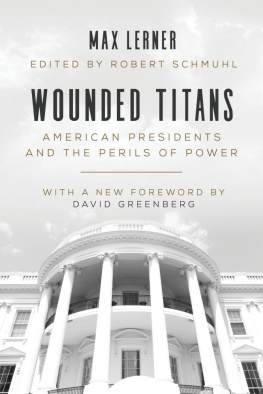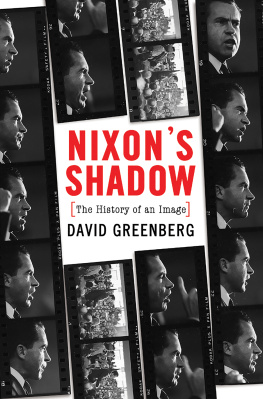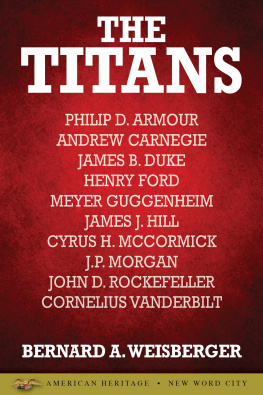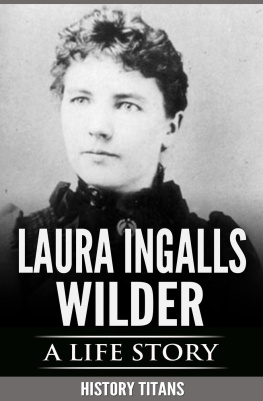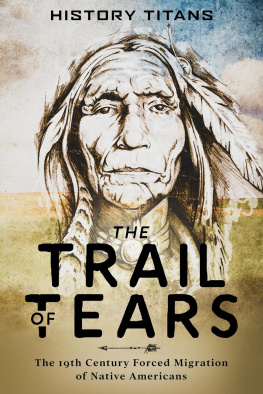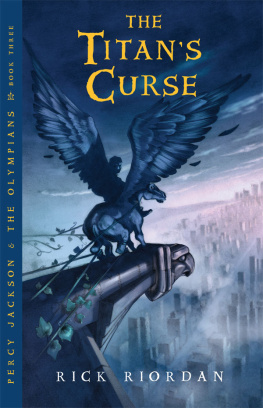

ALSO BY MAX LERNER
It Is Later Than You Think
Ideas Are Weapons
Ideas for the Ice Age
The Mind and Faith of Justice Holmes
Public Journal
The Portable Veblen
Actions and Passions
America as a Civilization
The Unfinished Country
The Age of Overkill
Education and Radical Humanism
Tocqueville and American Civilization
Values in Education
Ted and the Kennedy Legend
Wrestling with the Angel
Magisterial Imagination
Nine Scorpions in a Bottle
Thomas Jefferson: Americas Philosopher-King

Copyright 1996 by The Estate of Max Lerner
Foreword copyright 2017 by Skyhorse Publishing, Inc.
All rights reserved. No part of this book may be reproduced in any manner without the express written consent of the publisher, except in the case of brief excerpts in critical reviews or articles. All inquiries should be addressed to Arcade Publishing, 307 West 36th Street, 11th Floor, New York, NY 10018.
This Arcade Publishing paperback edition 2017
Arcade Publishing books may be purchased in bulk at special discounts for sales promotion, corporate gifts, fund-raising, or educational purposes. Special editions can also be created to specifications. For details, contact the Special Sales Department, Arcade Publishing, 307 West 36th Street, 11th Floor, New York, NY 10018 or arcade@skyhorsepublishing.com.
Arcade Publishing is a registered trademark of Skyhorse Publishing, Inc., a Delaware corporation.
Visit our website at www.arcadepub.com.
10 9 8 7 6 5 4 3 2 1
Library of Congress Cataloging-in-Publication Data is available on file.
Cover design by Erin Seaward-Hiatt
Print ISBN: 978-1-62872-767-8
Ebook ISBN: 978-1-62872-768-5
Printed in the United States of America
CONTENTS
FOREWORD TO THE 2017 EDITION
I N THE MANOR of American journalism, the political columnist and the intellectual essayist typically inhabit different and distant quarters. The former offers readers the hard-headed judgment of the savvy player, the confidant of power, rooting his credibility in his seasoned familiarity with Washingtons ways. The latter, in contrast, stands markedly and proudly aloof from the capital intrigue, using the perspective offered by distance and ratiocination and scholarly expertise to see what the insiders cannot. Rarely, but on occasion, political sophistication and burnished erudition come together in a single person. Walter Lippmann, most famously, was one in whom they did. Max Lerner was another.
Indeed, apart from Lippmann, no twentieth-century newspaper columnist combined academic learning with a feel for politics as ably as Lerner. A Russian immigrant and a graduate of Yale University, class of 1923, he earned a PhD from the Brookings Institution and went on to teach at Sarah Lawrence, Harvard, Williams, Notre Dame, and Brandeis, honing expertise in subjects from Thorstein Veblen and Machiavelli and Tocqueville to Thomas Jefferson and the Supreme Court. But he also wrote prolifically for magazines and newspapers, including the New Republic, the Nation, PM, and the New York Post, for which he banged out a regular column for more than forty years. Lerner wrote or edited nearly two dozen books as well.
As was typical for his generation of Jewish intellectuals, he began as a socialist, taken with the promise of a utopian society. Eventually the evil of the Soviet Union, as manifested in the MolotovRibbentrop non-aggression pact of 1939, made itself plain to him. Leery of his fellow left intellectuals who clung to their isolationism despite a rising Nazi menace, he matured into a Rooseveltian liberal, and it was his liberalism for which Lerner would be known most of his career. And yet by his last years he had grown disillusioned with post-1960s liberalism and, like many other onetime radicals, could be comfortably described as neoconservative, as he mustered praise and admiration for Ronald Reagan.
Wounded Titans, first published twenty years ago, assembles Lerners extensive writings on the American presidency from across this long career. The pieces include columns and essays, speeches and memoirs. Lerner coined the books title phrase while planning a book on the presidentsspecifically on the first six (Washington through John Quincy Adams) and on the six dominant men of his own time (Franklin Roosevelt through Nixon). Lerner considered the years of the mid-twentieth century to be years of the firestorm, as he once put itan age of trial and greatness, of depression, war, and American eminence. The presidents of this time evoked for him the Greek titans of myth: possessed of plenteous power yet constrained by forces stronger than themselves, tempted to assay grandiose projects but humbled by earthly limits. They were the wounded Titans, he wrote, reusing the phrase in a 1987 essay that is reprinted here, bearing the scars their lives had left on their character and temperament. There was a tragic component to Lerners view of the presidency, borne out in the experiences of the remarkable but flawed men whom he observed and reported on.
This emphasis on character and temperament, a recurring motif in the book, reveals Lerners appreciationlittle shared, alas, by political scientists and historians todayfor the crucial role of psychology in explaining the actions of public figures. Lerners facility with the insights of Freud, his readiness to acknowledge unconscious motivation, his acceptance of the impact of traumas and childhood experiences on adult behaviorall of this gives his commentary a weightiness and depth not found in most political pundits or policy wonks. Lerner is even willing to write frankly, and revealingly, about Eros and its place in democratic leadership, presenting the connection between president and people as the deepest of bonds.
The volume includes much more than commentary on the presidents. It opens with broad-ranging essays on American politicsfrom the period when Lerner wrote his magnum opus, America as a Civilization (1957)and the authors expertise in political thought and constitutional law permeate the articles. But the presidents are at the heart of this book. Lerners study of Jefferson, written long before the shift in scholarly consensus about his intimate liaison with his slave Sally Hemings, uses that controversial relationship to explore Jeffersons capacity for both philosophy and passion. In evaluating Roosevelt, Lerner is quick to note his flawsunderestimating Hitler, overestimating his own invincibilityyet doesnt let them outweigh the mans brilliant political instincts. Harry Truman, surprisingly, comes across as perhaps the most remarkable of the recent chief executives, his strength of character forged by a rugged life from which he emerged not an ordinary but an extraordinary man. And in one of the books final essays, Lerner writes of Pat Buchanans quixotic 1992 primary campaign these ominous words: This is the first time since the years for Father Charles Coughlin and Charles Lindbergh, in the middle and late 1930s, that the combined issue of anti-Semitism and isolationism has become something to reckon with in the political discourse.
Next page
